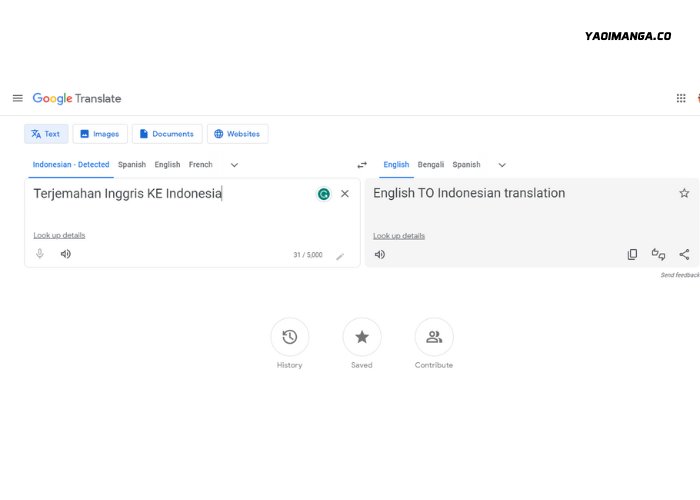In a world that’s more connected than ever, effective communication is the key to breaking down barriers. With globalization, the need for accurate and meaningful translation has surged, especially when it comes to translating from English to Indonesian (Terjemahan Inggris ke Indonesia). Whether it’s for business, education, or personal reasons, the art of translation plays a vital role in ensuring messages are conveyed accurately across language boundaries.
The Power of Translation
Imagine you’re working on an international project, collaborating with individuals from different parts of the world. English often serves as the common language, but not everyone may be fluent in it. This is where the magic of translation comes into play. The process of “Terjemahan Inggris ke Indonesia” opens doors to understanding, enabling diverse voices to contribute effectively.
Why Translation Matters
Translation isn’t just about swapping words from one language to another. It’s about capturing the essence, context, and nuances of the original text while adapting it to the target language. A skilled translator doesn’t merely translate words; they translate meaning. This is particularly important in fields like literature, where the beauty of language and storytelling must be preserved.
Translating Business Opportunities
In the business world, expansion knows no boundaries. When a company aims to enter the Indonesian market, accurate translation becomes a game changer. Product descriptions, marketing materials, and user manuals must all be translated to cater to the local audience. A minor miscommunication can lead to confusion or worse damage to the brand’s reputation. That’s why businesses rely on experts for Terjemahan Inggris ke Indonesia to ensure accuracy and cultural sensitivity.
The Nuances of Culture
Languages don’t exist in isolation; they’re intertwined with culture. A successful translation goes beyond mere words it respects the cultural nuances and sensitivities of the target audience. For instance, idiomatic expressions in English might not make sense when directly translated into Indonesian. A skilled translator understands this and crafts translations that feel natural to the local readers.
Challenges in Translation
The path of translation is not without its challenges. One major obstacle is the existence of words or concepts in one language that have no direct equivalent in another. This can lead to creative solutions, where the translator finds ways to convey the intended meaning without compromising accuracy. Additionally, the rapid evolution of language and the emergence of new terms can make the translation process an ongoing endeavor.
The Role of Technology
In today’s digital age, technology has transformed the translation landscape. Machine translation tools like Google Translate offer instant results, but they often lack the finesse of a human touch. While technology can be a helpful aid, it can’t replicate the deep understanding of context and culture that a human translator brings to the table. For critical documents and meaningful communication, human translators remain indispensable.
The Future of Translation
As the world continues to shrink due to technological advancements, the demand for translation will only grow. The field of Terjemahan Inggris ke Indonesia will evolve, incorporating AI-driven tools that assist human translators and improve efficiency. However, the human element, the ability to understand emotions, subtext, and cultural nuances will remain invaluable.
Why Translations must be Precise
Translation is a process of taking words, phrases, and texts from one language and converting them into another language. Translating English to Indonesian is a difficult task as there are many differences in grammar and vocabulary between the two languages. When translating from one language to another, it is important to be precise and accurate to ensure that the text is accurately conveyed and that any nuances are understood.
One of the most important aspects of translating English to Indonesian is ensuring that the text is accurate. It is not enough to simply substitute words or phrases; instead, the translator must understand the context of the original text and convey that meaning in the translated version. This requires an understanding of both languages and an ability to identify nuances in the text.
The Importance of English to Indonesian Translation
English to Indonesian translation is an important tool in today’s globalized world. The ability to communicate effectively with people in different countries is essential for businesses, governments, and individuals alike. Indonesian is the official language of Indonesia and is spoken by over 230 million people. English, on the other hand, is the most widely spoken language in the world, with over 1.5 billion speakers. This makes English to Indonesian translation a vital tool for communication between different countries.
English to Indonesian translation has become even more important with the rise of the internet and globalization. As more businesses and organizations move to doing business online, it is essential that they are able to communicate effectively with customers and partners in other countries. English to Indonesian translation makes this possible by allowing people to communicate in their native language without having to learn a new one.
Conclusion
Terjemahan Inggris ke Indonesia is more than just converting words; it’s a bridge that connects cultures, fosters collaboration, and enables meaningful interactions. In a world where effective communication is the cornerstone of progress, skilled translators play a pivotal role in ensuring that language is never a barrier. So whether it’s for business expansion, literary exploration, or personal connection, the art of translation continues to shape our global landscape.
